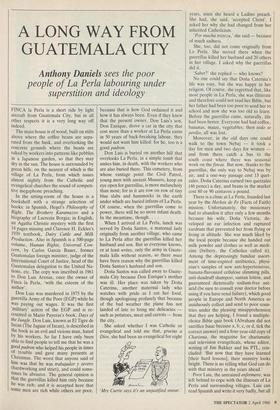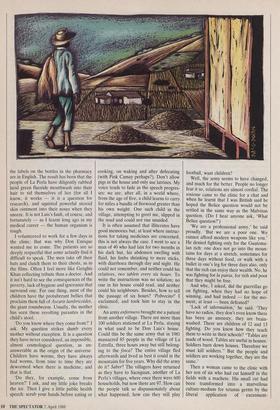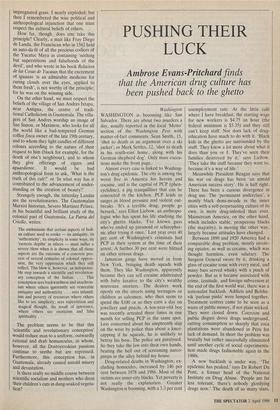A LONG WAY FROM GUATEMALA CITY
Anthony Daniels sees the poor
people of La Perla labouring under superstition and ideology
FINCA la Perla is a short ride by light aircraft from Guatemala City, but in all other respects it is a very long way off indeed.
The main house is of wood, built on stilts above where the coffee beans are sepa- rated from the husk, and overlooking the concrete grounds where the beans are raked by workers into patterns like pebbles in a Japanese garden, so that they may dry in the sun. The house is surrounded by green hills, on the nearest of which is the village of La Perla, from which issues almost nightly from the Catholic and evangelical churches the sound of competi- tive megaphone preaching.
In the sitting-room of the house is a bookshelf with a strange selection of books: in Spanish, Hegel's Philosophy of Right, The Brothers Karamazov and a biography of Lucrezia Borgia; in English, an Agatha Christie mystery with the first 14 pages missing and Clarence H. Eckles's 1939 textbook, Dairy Cattle and Milk Production. Also in Spanish is a 500-page volume, Human Rights, Universal Con- cern, by Carlos Garcia Bauer, former Guatemalan foreign minister, judge of the International Court of Justice, head of the Guatemalan delegation to the United Na- tions, etc. The copy was inscribed in 1961 to Don Luis Arenas, once the owner of Finca la Perla, 'with the esteem of the author'.
Don Luis was murdered in 1975 by the guerrilla Army of the Poor (EGP) while he was paying out wages. It was the first 'military' action of the EGP and is re- counted in Mario Payeras's book, Days of the Jungle. Don Luis, known as El Tigre de Ixcan (The Jaguar of Ixcan), is described in the book as an evil and vicious man, hated by his workers. So far I have only been able to find people to tell me that he was a good padron who helped his people in times of trouble and gave many presents at Christmas. The worst that anyone said of him was that he was trabajador y severo (hardworking and strict), and could some- times be abrasive. The general opinion is that the guerrillas killed him only because he was rich; and it is accepted here that some men are rich while others are poor, because that is how God ordained it and how it has always been. Even if they knew that the present owner, Don Luis's son, Don Enrique, drove a car in the city that cost more than a worker at La Perla earns in 50 years of back-breaking labour, they would not want him killed: for he, too is a good padron.
Don Luis is buried on another hill that overlooks La Perla, in a simple tomb that unites him, in death, with the workers who are also buried there. This cemetery, from whose vantage point the Civil Patrol, young men with ancient Mausers, keep an eye open for guerrillas, is more melancholy than most; for in it are row on row of tiny blue slabs and hummocks in the earth under which are buried infants of La Perla. Of course, when the guerrillas come to power, there will be no more infant death. In the meantime, though. . .
When I arrived at La Perla, lunch was served by Dona Santos, a maternal lady originally from another village, who came to La Perla after the guerrillas killed her husband and son. But as everyone knows, or at least writes, only the army in Guate- mala kills without reason, so there must have been reason why the guerrillas killed Doria Santos's husband and son.
Dona Santos was called away to Guate- mala City because Don Enrique's mother was ill. Her place was taken by Dona Caterina, another maternal lady who watches with pride as I eat her food, though apologising profusely that because of the bad weather the plane has not landed of late to bring me delicacies such as potatoes, meat and carrots — from the city.
She asked whether I was Catholic or evangelical and told me that, gracias a Dios, she had been an evangelical for eight `Mrs Currie says its an unjustified smear.' years, since she heard a Ladino preach. She had, she said, 'accepted Christ'. I asked her why she had changed from her inherited Catholicism.
Tor mucha tristeza,' she said — because of much sadness.
She, too, did not come originally from La Perla. She moved there when the guerrillas killed her husband and 20 others in her village. I asked why the guerrillas did it.
`Saber?' she replied — who knows?
No one could say that Dona Caterina's life was easy, but she was happy in her religion. Of course, she regretted that, like most people in La Perla, she was illiterate and therefore could not read her Bible, but her father had been too poor to send her to school and now she was too old to learn. Before the guerrillas came, naturally, life had been better. Everyone had had coffee, bananas, maize, vegetables; then todo se perdio, all was lost.
Moreover, in the old days one could walk to the town Nebaj — it took a day for men and two days for women and from there catch a bus to the south coast where there was seasonal work on the fincas. But now, thanks to the guerrillas, the only way to Nebaj was by air, and a one-way passage cost 13 quet- zales. Dona Caterina earned two quetzales (46 pence) a day, and beans in the market cost 80 or 90 centavos a pound.
There is a clinic at La Perla, founded last year by the Hechos de Fe (Facts of Faith) mission. Unfortunately, the missionary had to abandon it after only a few months because his wife, Dona Victoria, de- veloped an ear infection and ruptured eardrum that prevented her from flying or living at altitude. She was much liked by the local people because she handed out milk powder and clothes as well as medi- cine (bribery, the Catholics called it). Among the depressingly familiar assort- ment of time-expired antibiotics, physi- cian's samples of new anti-hypertensives, banana-flavoured cellulose slimming pills, anti-dandruff shampoo, suntan lotion, and guaranteed dietetically sodium-free ant- acid (be sure to consult your doctor before using if you have renal failure), which good people in Europe and North America so assiduously collect and send to poor coun- tries under the pleasing misapprehension that they are helping, I found a multiple- choice Bible quiz book (Abraham did not sacrifice Isaac because a, b, c, or d, tick the correct answer) and a four-year-old copy of Charisma, the magazine for charismatic and television evangelicals, whose editor, writing of Jim Bakker and his PTL, con- cluded: 'But now that they have learned [their hard lessons], their ministry looks bright. There is no telling what God can do with that ministry in the years ahead.'
Poor Luis, the untrained enfermero, was left behind to cope with the illnesses of La Perla and surrounding villages. Luis can read Spanish and write it very badly, but all the labels on the bottles in the pharmacy are in English. The result has been that the people of La Perla have diligently rubbed lurid green fluoride mouthwash into their hair to rid themselves of lice (for all I know, it works — it is a question for research), and squirted powerful steroid skin ointment into their noses when they sneeze. It is not Luis's fault, of course, and fortunately — as I learnt long ago in my medical career — the human organism is tough. I volunteered to work for a few days in the clinic: that was why Don Enrique wanted me to come. The patients are so deeply respectful that some actually find it difficult to speak. The men take off their hats and clutch them to their chests, as in the films. Often I feel more like Genghis Khan collecting tribute than a doctor. And it isn't hard to see the consequences of the poverty, lack of hygiene and ignorance that surround one. For one thing, most of the children have the protuberant bellies that proclaim them full of Ascaris lumbricoides, the giant roundworm. Usually, the mother has seen these revolting parasites in the child's stool.
`Do you know where they come from?' I ask. My question strikes dumb every mother without exception. It is a question they have never considered, an impossible, almost cosmological question, as un- answerable as the origin of the universe. Children have worms, they have always had worms, from time to time they are dewormed when there is medicine, and that is that.
'Do they, for example, come from heaven?' I ask, and my little joke breaks the ice. Then I give a little public health speech: scrub your hands before eating or cooking, on waking and after defecating (with Pink Camay perhaps?). Don't allow pigs in the house and only use latrines. My voice tends to fade as the speech progres- ses: we are, after all, in a world where, from the age of five, a child learns to carry for miles a bundle of firewood greater than his own weight. One such child in the village, attempting to greet me, slipped in the mud and could not rise unaided.
It is often assumed that illiterates have good memories but, at least where instruc- tions for taking medicines are concerned, this is not always the case. I went to see a man of 40 who had lain for two months in his dark hut, his abdomen swelling with fluid, his limbs shrinking to mere sticks, with diarrhoea through day and night. He could not remember, and neither could his relatives, two tablets every six hours. To write the instructions was no solution; no one in his house could read, and neither could his neighbours. Besides, how to tell the passage of six hours? Tobrecitor I exclaimed, and took him to stay in the clinic.
An army enfermero brought me a patient from another village. There are more than 100 soldiers stationed at La Perla, staying in what used to be Don Luis's house. Could this be the same army that in 1981 massacred 85 people in the village of La Estrella, three hours away but still belong- ing to the finca? The entire village fled afterwards and lived as best it could in the mountains for five years. Why did the army do it? Saber? The villagers have returned as they have to Sacsiguan, another of La Perla's villages, where once there were 600 households, but now there are 97. How can the people talk so dispassionately about what happened, how can they still play football, want children?
Well, the army seems to have changed, and much for the better. People no longer fear it so, relations are almost cordial. The teniente came to the clinic for a chat and when he learnt that I was British said he hoped the Belice question would not be settled in the same way as the Malvinas question. (Do I hear anyone ask, 'What Belice question?') `We are a professional army,' he said proudly. 'But we are a poor one. We cannot afford modern weapons like you.' He denied fighting only for the Guatema- lan rich: one does not go into the moun- tains for days at a stretch, sometimes for three days without food, or walk with a bullet in one's leg for three days also, only that the rich can enjoy their wealth. No, he was fighting for la patria, for rich and poor that they might be free.
And why, I asked, did the guerrillas go on fighting, when they had no hope of winning, and had indeed — for the mo- ment, at least — been defeated?
`Lack of information,' he said. 'They have no radios, they don't even know there has been an amnesty, they are brain- washed. There are children of 12 and 13 fighting. Do you know how they teach them to write in their schools? "Tables are made of wood. Tables are useful in houses. Soldiers burn down houses. Therefore we must kill soldiers." But the people and soldiers are working together, they are the same.'
Then a woman came to the clinic with her son of six who had cut himself in the fields with a machete. His small cut had been transformed into a marvellous culture-medium for tetanus germs by the liberal application of excrement- impregnated grass. I nearly exploded; but then I remembered the wise political and anthropological injunction that one must respect the cultural beliefs of others.
How far, though, does one take this principle? Clearly, a man like Fray Diego de Landa, the Franciscan who in 1562 held an auto-da-fe of all the precious codices of the Yucatec Maya as containing 'nothing but superstitions and falsehoods of the devil', and who wrote in his book Relation de las Cosas de Yucatan that the excrement of iguanas 'is an admirable medicine for curing clouds over the eyes, applied to them fresh', is not worthy of the principle; for he was on the winning side.
On the other hand, we must respect the beliefs of the village of San Andres Ixtapa, near Antigua, the centre of tradi- tional Catholicism in Guatemala. The villa- gers of San Andres worship an image of San Simon, or Maximon, who looks for all the world like a bad-tempered German coffee finca owner of the late 19th century, and to whom they light candles of different colours according to the nature of their request to him (black for example, for the death of one's neighbour), and to whom they give offerings of cigars and aguardiente. It would be bad Anthropological form to ask, 'What is the truth of this cult?' or 'In what way has it contributed to the advancement of under- standing or the creation of beauty?'
Strangely enough, the latterday Landas are the revolutionaries. The Guatemalan Marxist historian, Severo Martinez Pelaez, in his beautiful and brilliant study of the colonial past of Guatemala, La Patria del Criollo, writes: The enthusiasm that certain aspects of Indi- an culture used to evoke — its antiquity, its 'authenticity', its simplicity in some ways, its 'esoteric depths' in others — must suffer a severe blow when it is shown that all those aspects are the outcome of a concrete pro- cess of several centuries of colonial oppres- sion, the very oppression which they still reflect. This blow is, however, an indispensa- ble step towards a scientific and revolution- ary conception of the Indian. . . . This conception sees backwardness and anachron- ism where others ignorantly see venerable antiquity and authenticity . . . sees infantil- ism and poverty of resources where others like to see simplicity; sees superstition and magical thought, the result of ignorance, where others see exoticism and false
spirituality . .
The problem seems to be that this 'scientific and revolutionary conception' would reduce man to a uniform, outwardly rational and drab homunculus, in whom, however, all the Dostoyevskian passions continue to seethe but are repressed. Furthermore, this conception has, in Guatemala, already caused untold misery and devastation.
Is there really no middle course between scientific socialism and mothers who dress their children's cuts in dung-soaked vegeta- tion?




















































 Previous page
Previous page